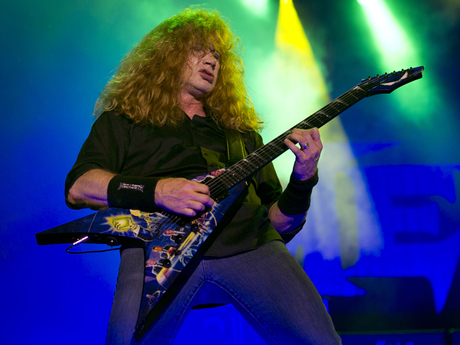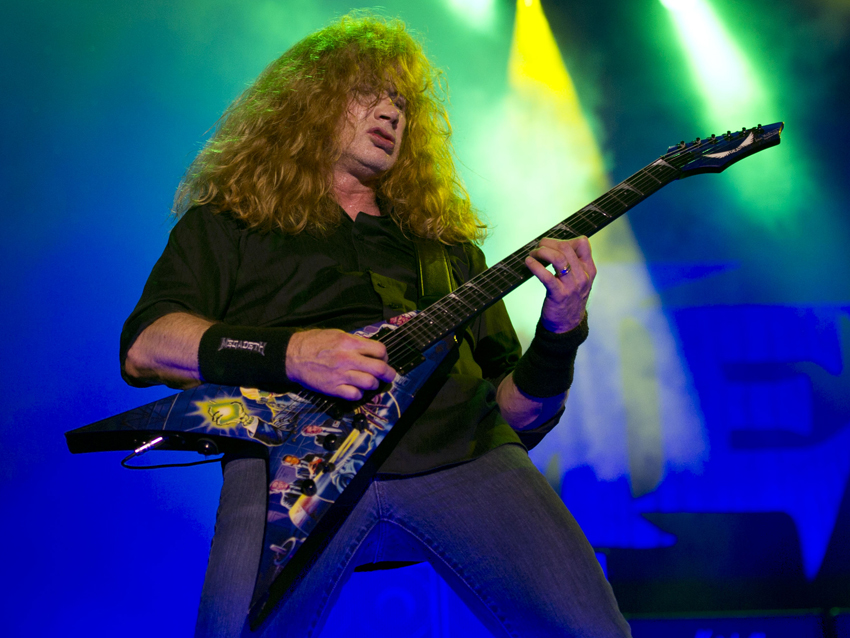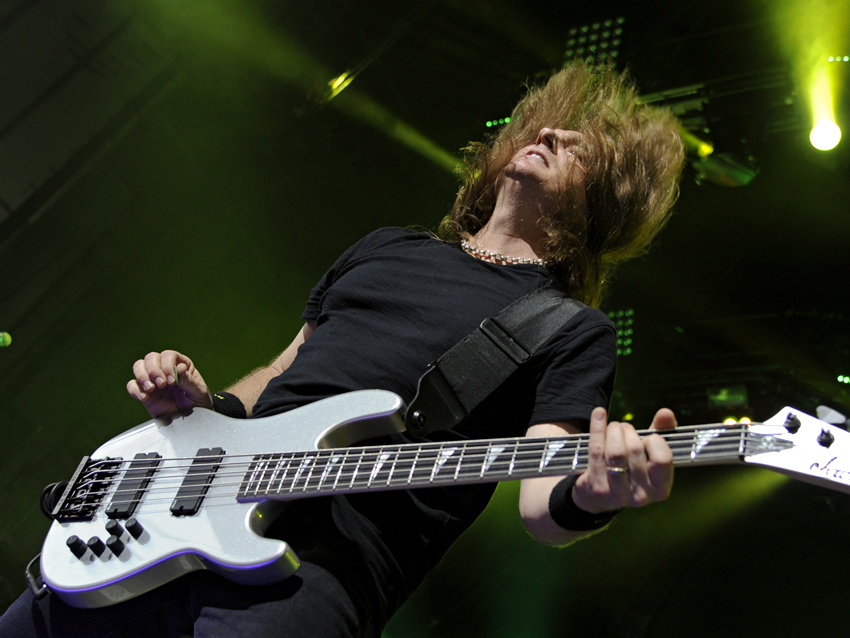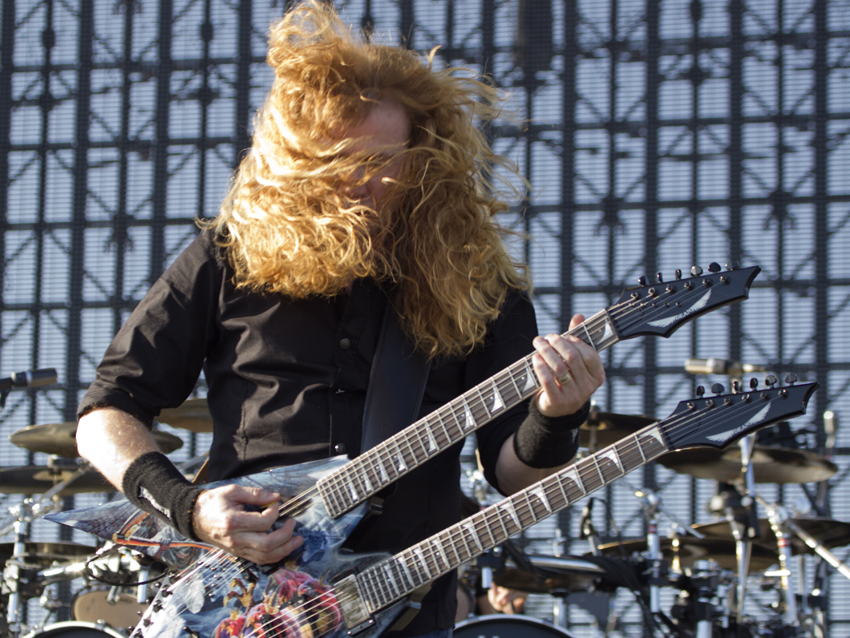

With TH1RT3EN, Dave Mustaine and Megadeth have their strongest album in years. © Lucas Oleniuk/ZUMA Press/Corbis
Were it just for the Big 4 concerts alone - the turbo-fueled, dream lineup of Anthrax, Slayer, Megadeth and Metallica - Dave Mustaine could rest easy on a year well spent. But the metal legend did much more in 2011, issuing TH1RT3EN, Megadeth's most vital album in years, one which sees the triumphant return of founding bassist Dave Ellefson to the fold after an eight-year-absence.
Mustaine admits that, although he secretly hoped that Ellefson would rejoin at some point, it wasn't the plan when he began TH1RT3EN. "It's just one of those things that happened because it was supposed to," he says. On the subject of the acrimony that existed between him and Ellefson during their separation, Mustaine says, "We all make mistakes. I've made plenty of mistakes that are right up there. But in God's world, everything is perfect."
The Dave Mustaine of 2011 is a relatively reflective one - and indeed, introspection appears to come easily to the maverick musician these days. During the course of our interview - and this is only Part One (Part Two will come soon) - Mustaine talked voluably on subjects ranging from his mended relationship with Metallica, welcoming Ellefson back to the band, songwriting, and how he comes up with such ginormous, panoramic riffs.
And this is just Part One of our discussion. Part Two will follow soon...
You played a few songs with Metallica the other night at their 30th anniversary celebration. It must feel pretty nice to have mended all fences with them.
"You know, there's still going to be some dumb fucker who says to me, 'So, do you guys get along?' [laughs] I just know it. The world is full of idiots, and I seem to run into a lot of them.
Want all the hottest music and gear news, reviews, deals, features and more, direct to your inbox? Sign up here.
"It does feel good, though. It was very cathartic to go up there last weekend. I was pretty unsure of what was going to happen. I wasn't nervous; I just didn't know what to expect. Those guys are a lot different from Megadeth. We like to know what songs we're going to do. They play pretty loose from the hip - which is cool.
"I was trying to figure out, Do I learn the demo versions of the songs or the Kill 'Em All versions of the songs? Well, I found out it was the Kill 'Em All versions. OK, do I learn my solos from the demos, or Kirk's solos? What solos should I play? Then, when I got there, Kirk said, 'You know, why don't you play all the solos?' And I was like, 'Oooh!' [laughs] I had to quickly go through my bag of tricks.
"In the end, I got up on stage, and everything came together. I was making it much too difficult for myself. It was fun, I had a good time, everybody smiled a lot. Gave out a bunch of high-five knuckles and hugs. Lars kissed me a couple of times...[laughs]
"It's neat that people are able to see what this whole thing is about. The media made this so ugly for so long. We all still really care about each other. Everything has come full circle. It's 30 years later, and here we are. It's really weird, the whole mythology to this."
Let's get into your new record. Did the experience of writing your memoir affect your songwriting for TH1RT3EN in any way?
"No, no. You know, it's the same story. I don't try to play up what happened, because too many people know it all. Now, the song 13 is much more melancholy in mood, and it's basically about the same thing as the memoir. You get to feel it a bit more. It's not like Spinal Tap in D minor, though." [laughs]
To divert for a second, on certain albums like Symphony of Destruction and Peace Sells, there seems to be some more pronounced pop hooks. Did you listen to pop music at during those periods?
"No, not really. I listened to that stuff growing up because I have three big sisters. They listened to Motown and the British Invasion and everything else. By the time I picked up a guitar, I was playing along to the British Invasion stuff.
"What influenced me as a songwriter was the New Wave Of British Heavy Metal. And the funny thing is, all this stuff about British, British, British - it all goes back to America, really. Robert Johnson created rock 'n' roll. But I'm not that deep into pop music. I certainly know about it. My wife and daughter both ride horses, and obviously country music goes right along with it.
"I can respect country music a lot. I think they've got a lot of great songwriters in the field. Country music is starting to get some guitar players that are of a metal ilk. James Durbin was in a metal band when he was younger, which isn't surprising because he's got some good guitar chops."
When you went in to record TH1RT3EN, knowing that Dave Ellefson was back in the band, did you have a different sort of agenda?
"No, no, no. It was obviously more fun, and that's not to take away from any of the guys who played with us while Dave was on his…his 'time out,' so to speak. When he came back, we were writing the song Sudden Death. I was just getting ready to play bass on the track - that's right where things had ended with James Lomenzo - but Dave was there and I said, 'Hey, do you feel like recording something?'
"We were discussing doing the Rust In Peace tour, but it was only going to be month's worth of dates to see how it went. We just wanted to see what it would be like. After the month, we were able to say that it had gone great. Dave had revived his career, and our friendship was very hearty.
"You know, when things went down with us, I didn't want that. I didn't want those problems. I love the guy. But that's what a relationship does - it's a living, breathing organism. But it was very painful when all that stuff happened with us. I was secretly hoping that we would be friends again, but I didn't know if we'd ever play together.
"When he sat down to do the bassline to Sudden Death, he sat in the control room with the door open. He said, 'I'm going to do a Diamond Head part right here' - and Diamond Head is one of my favorite bands. That aroused me a little bit. Then he goes, 'This next part, I'm going to do a little Budgie part' - and Budgie is another one of my favorites. I was like, 'Oh my God, this guy's messin' with my head, bringing up all these bands that I love. If he's playing me right now, he's doing it pretty good!'" laughs]

Dave Ellefson, back in the Megadeth fold after eight years. © Amy Harris/Corbis
"I listened to his bass part and it was amazing! See, here's the thing about Dave: When I met him, he was really, really young. He was a great player, but he had made a decision to come out to Musicians Institute to go to B.I.T, which is the Bass Institute of Technology. He wanted to learn how to shred that way.
"I told him, 'I don't think you should go to that place because you'll never get a gig. Anybody that goes there gets really, really good, and then that's the end of it.' No offense to them - I don't want to say anything bad about the place.
"But I told Dave, 'I'll teach you.' And I showed him how to play bass like a lead guitar. One of the most famous bass parts we have is the Peace Sells part, and I had written that and showed it to him. Dave has an ability all his own. He's solid. When we played together, the day he came back, it was awesome! It was like the metamorphosis of a chrysalis bursting open and the monarch spreading its wings.
"Much like that cliché of the kid pulling it out too soon and his wings were too weak to fly, if Dave and I had tried to get it together before the time was right, it wouldn't have clicked. We had talked about him coming back to the band several times. We met, and he told me he was sorry for what he had done, and I told him I loved him and forgave him.
"That was one of the things that bugged people in the metal community a lot, because they love Dave. When we parted ways, I was the asshole. It was easy to pin it all on me. But I stated, and I stand by this, and I sure Dave would corroborate my story, that it wasn't me, and I didn't intend on these things going wrong.
"We all make mistakes. I've made plenty of mistakes that are right up there. But in God's world, everything is perfect. Dave's a Christian, and I'm a Christian. We don't let that bother other people. We don't force it on people. It doesn't show up in our music other than the fact that we just love to play together.
"You know, people said that when I got married my music was going to get wimpy; they said when when I got sober my music would get wimpy; that when I got saved, it would get wimpy, and so on. I've made some bad records over my career, but you can't blame them on drugs or no drugs, God or no God, wife or no wife. That's ludicrous.
"If you're a great player, you should be able to get sober and still play well. I used to get the jitters when I would go on stage. It might be a harder when you first get sober. But there's no magical bottle, you know, where you take a swig and you get great all of a sudden. I've tried it. I've tried it drunk, I've tried it sober. I've tried it on smack and without it; tried it on coke and without it. All the drugs that make their way through the music industry. There's been a lot of stuff that's come and gone."

Mustaine rocks his Dean signature doubleneck (and some serious hair!) at the Big 4 in Indio, CA, 2011. © Paul Hebert/Corbis
You mentioned the New Wave Of British Heavy Metal before. The song Public Enemy No. 1 has a bit of that vibe to it.
"Yeah, I agree with that. A song is only as good as its parts, and the main riff in that one shows up at least three different ways, just alternating the picking pattern in one place, and going from a riff to half of a riff with some chords. Then we play the riff but double up in intensity and speed. I think the song is very simple, and that's what made so much of the New Wave Of British Heavy Metal so cool.
"During the '90s, when Countdown came out and on Youthanasia, we experimented a bit with chords, but a lot of that was because we were forced to. The music industry was turning on itself, and Nirvana were huge at the time. There was no place for metal; it was being forced underground. We were used to surviving at a pretty high level, so that was hard on us."
Speaking of riffs, We The People is a riff-extravaganza. How do you write and compile riffs - do you have any kind of process?
"There isn't really a set formula. It's not like I sit down with lyrics and a melody in my head and I'll play through the song straight through. There aren't many artists that can do that. I've only done that one time when I wrote In My Darkest Hour, and that was when Cliff [Burton] died. He and I were very close.
"For most musicians, you sit down and come up with parts, and you go over and over and over them again. I usually have a riff that will be a section, and there will be more sections, like Lego blocks. There will be pieces in the beginning, and pieces in verse, in the chorus…
"Some songs will have a pre-chorus; other songs won't - we'll go right from the verse into the chorus. Some songs will have a re-intro from the chorus into the verse; other songs won't. The only other thing that's middle is the middle eight, which could be a guitar solo, or it could be different modulating parts.
"For me, with riffs and parts, I take all the stuff and file it. When I came out of retirement, I said that I had 150 riffs that I'd saved up. Yeah, I had a lot of riffs, but there was a lot of duplicity. I had done a riff, but there had been so many years since I'd heard it that I basically wrote it all over again. But this is the…one, two, three, fourth record we've done since I came out of retirement."
Joe is a freelance journalist who has, over the past few decades, interviewed hundreds of guitarists for Guitar World, Guitar Player, MusicRadar and Classic Rock. He is also a former editor of Guitar World, contributing writer for Guitar Aficionado and VP of A&R for Island Records. He’s an enthusiastic guitarist, but he’s nowhere near the likes of the people he interviews. Surprisingly, his skills are more suited to the drums. If you need a drummer for your Beatles tribute band, look him up.
